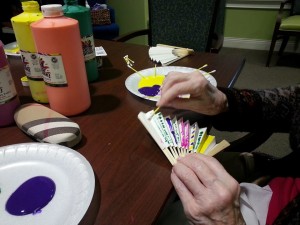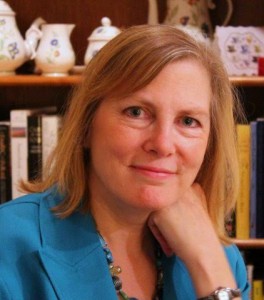 After 20 years in the rehabilitation counseling field, I realized as I approached the age of 60, that I needed a career change. Was there a job for me that would provide a better balance in my life to focus on writing? I discovered, to my surprise and delight, that working with elders as an activities specialist was the perfect “day job” for being a writer. Indeed, I love my job!
After 20 years in the rehabilitation counseling field, I realized as I approached the age of 60, that I needed a career change. Was there a job for me that would provide a better balance in my life to focus on writing? I discovered, to my surprise and delight, that working with elders as an activities specialist was the perfect “day job” for being a writer. Indeed, I love my job!
I work at an assisted living community for seniors. The most important goal of my job is to engage seniors in rewarding activities and events every day. Ideally, in this field, we call it “purposeful engagement.” Yet honestly, for me personally, these seniors engage me in a purposeful way everyday—and nothing is more comforting than that!
Seniors, particularly people in their 80s and 90s, are not so caught up in the mainstream digital habits of social media, constant texting and checking the internet. They don’t bother with how many “Likes” they’re getting, or feverishly rush to keep up with every person on the planet on their phones. They’re not looking down or distracted when people try to make eye-contact with them. They prefer good old-fashioned conversation, and often deep, meaningful interaction. They have time for conversation and they’re hungry for more conversation.
Fortunately, in my job leading discussion groups, I savor the honor of hearing their life stories as we explore topics ranging from the presidential election to the poetry of Mary Oliver. Name the topic, and I’m blessed with their insights, historical perspectives, humorous anecdotes, or sad experiences of loss. I learn from them, but even more, I feel validated and heartened that they appreciate my listening, curiosity and respect for their life’s experiences—their great accomplishments as well as their simple pleasures. They’re always ready for honest, thoughtful conversation, and it’s my job to gather them together for this most vital human activity.
To spark a good discussion, I warm up the group with a few famous quotes pertinent to the topic, or a provocative Youtube video, an article, or even my own little life story. I’m always stimulated by the challenges of bringing opposed views together in a lively (hopefully not-too heated) debate. Yes, it does get heated at times, especially with our current election, but these moments are also opportunities for practicing (and modeling) real comforting skills— patience, respectful listening, compassion, the empathy needed to acknowledge someone’s true feelings. I must put comforting into action every day, not just because it’s good for me, but because it’s my job. This kind of service as a comforter is a good reason for me to get up out of bed every morning and rush out the door to work.
And when I sit down at my desk to write anything about the topic of comforting, I feel completely authentic, walking the talk of comforting because this is my job. By participating in deep conversations with elders every week, engaged in reflection, thoughtfulness and moments of wonder, I’m called to write, and the writing flows. The passion for my work stirs the words waiting to be written.
This makes me wonder about other writers and creatives who don’t have enough time for deep, meaningful conversations on a regular basis. What happens when intense, expressive people don’t have time for reflection and thoughtful consideration? Even introverts need time to have a good talk or a long thinking-over with a trusted confidante. What might they be missing, even if they’re productive, though meeting their deadlines and finishing their projects? I hope they’re not missing too much—for their own fulfillment. In the meantime, I’m so fortunate to be in the company of elders because our conversations nourish my writing. And this, I hope, nourishes others yearning for deeper connection in a vast, complicated, digital world.
 Val Walker, MS, is the author of The Art of Comforting: What to Say and Do for People in Distress(Penguin, 2010), and a Nautilus Book Award Gold Medalist in 2011. The Art of Comforting was listed as recommended reading by the Boston Public Health Commission’s Guide for Survivors of the Marathon Bombing. Val’s articles have appeared in Whole Living Magazine, AARP Bulletin, Coping with Cancer Magazine, and other national publications. Formerly a rehabilitation counselor, she now works as an activities specialist leading groups for seniors with Alzheimer’s, and other groups with disabilities. To learn more about Val you can visit her website, The Art of Comforting.
Val Walker, MS, is the author of The Art of Comforting: What to Say and Do for People in Distress(Penguin, 2010), and a Nautilus Book Award Gold Medalist in 2011. The Art of Comforting was listed as recommended reading by the Boston Public Health Commission’s Guide for Survivors of the Marathon Bombing. Val’s articles have appeared in Whole Living Magazine, AARP Bulletin, Coping with Cancer Magazine, and other national publications. Formerly a rehabilitation counselor, she now works as an activities specialist leading groups for seniors with Alzheimer’s, and other groups with disabilities. To learn more about Val you can visit her website, The Art of Comforting.


